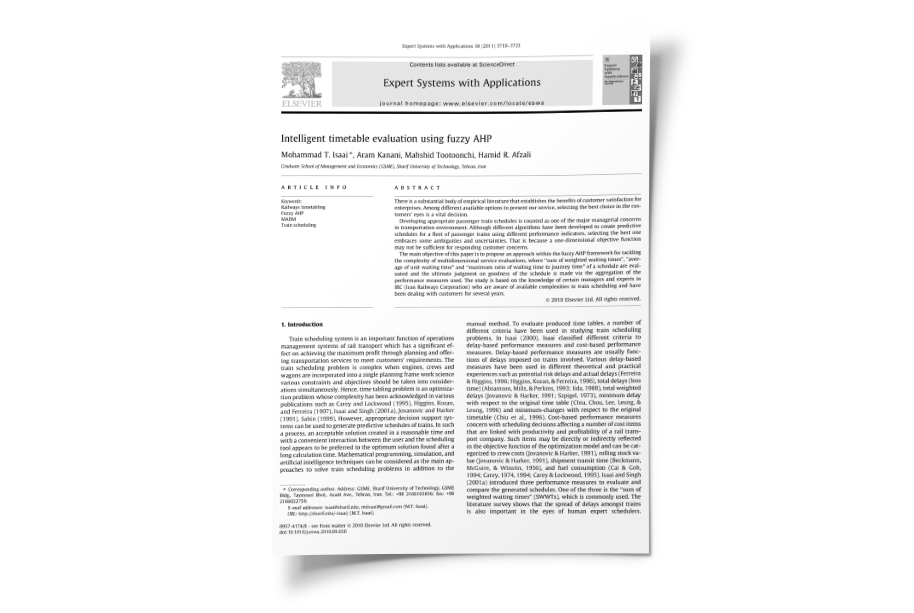Intelligent timetable evaluation using fuzzy AHP
Abstract
There is a substantial body of empirical literature that establishes the benefits of customer satisfaction for enterprises. Among different available options to present our service, selecting the best choice in the customers’ eyes is a vital decision.
Developing appropriate passenger train schedules is counted as one of the major managerial concerns in transportation environment. Although different algorithms have been developed to create predictive schedules for a fleet of passenger trains using different performance indicators, selecting the best one embraces some ambiguities and uncertainties. That is because a one-dimensional objective function may not be sufficient for responding customer concerns.
The main objective of this paper is to propose an approach within the fuzzy AHP framework for tackling the complexity of multidimensional service evaluations, where “sum of weighted waiting times”, “average of unit waiting time” and “maximum ratio of waiting time to journey time” of a schedule are evaluated and the ultimate judgment on goodness of the schedule is made via the aggregation of the performance measures used. The study is based on the knowledge of certain managers and experts in IRC (Iran Railways Corporation) who are aware of available complexities in train scheduling and have been dealing with customers for several years.
Potential Industry Impact
- In this study, three timetables developed by intelligent algorithms (CBH, HeuSa and HeuTS) using three performance measures (SWWT, AUWT and MRWJ) have been compared. The fuzzy AHP approach facilitated the knowledge capture of human experts and quantification of expert judgments which is hard, if not impossible.
- Since the analysis framework proposed is based on the knowledge of experts familiar with scheduling complexity on the one hand and customer concerns on the other hand, it provides the possibility and flexibility for conducting similar study in complex projects.
Academic Impact
- Human expert judgment is most often multidimensional, and they are expected to develop solutions which are treated appropriate from various angles; as a result, when a computerized timetabling support system is used, they must be able to compare different timetables with respect to improvement achieved in terms of criteria being used.
- The relative importance of performance measures being used (SWWT, AUWT and MRWJ in this paper) is a fuzzy concept; and decision makers face uncertainty and vagueness in comparing subjective perception of improvement quoted using crisp data. For instance, experts, based on experiences, have recognized that less than 10% improvement of a certain criterion cannot be considered as a major preference in the eyes of passengers, therefore, most human experts prefer natural language expressions to sharp numerical values for comparative assessments. As a result, considering the nature of the problem, this paper focused on the application of the fuzzy AHP technique to tackle the issue and recognized it appropriate to select the best timetable.

Authors:
Mohammad T. Isaai, Aram Kanani, Mahshid Tootoonchi, Hamid R. Afzali
Journal:
Expert Systems with Applications, Volume 38 (April, 2011)
Read:
https://doi.org/10.1016/j.eswa.2010.09.030



Leave a Reply